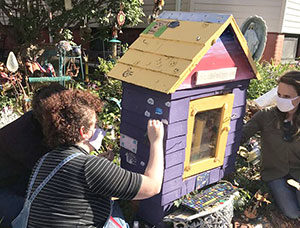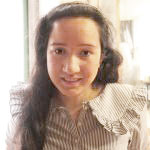
Miniature houses provide page-turners to people of all ages.
By Shira Laucharoen
Somerville Wire
Copies of Kerouac’s “On the Road,” Sue Grafton mysteries, and an American cookbook line the shelves of Ellie Botshon’s Little Free Library on 28 Jay Street. While she has housed the structure on her property for about five years, similar book collections have been popping up all over Somerville for some time now, offering passers-by the opportunity to pick up a read or donate their own.
“It started with my sister, who is an English literature professor,” said Botshon. “She got one for her house, and I loved the idea, so I got one as well. At the same time, ironically, my business partner and our assistant also got a Little Free Library in their house, and we work together. It’s a nice way of connecting with each other and the people in the community. It gets used daily, and it’s cool to watch, seeing what books come in and go.” She added, “It’s everything from Harry Potter for kids, to fiction, to a Java computer writing book. It’s a very eclectic bunch of books. A lot of them are best sellers, and then you always get one or two that are like, what is this?”
A Little Free Library is a miniature house, often with shelves, that sits on a person’s land outside their actual home. Curators like Botshon can support the circulation of books by depositing their own titles, but the way the libraries work is that anyone on the street can stop over and grab one for free or leave behind their unwanted texts. Botshon painted hers dark red to match her house and dug a hole in the ground, making the library sturdy by adding cement. She said that she has many regular visitors.
“Over the past year, there’s been a very even flow of books going in and out,” said Botshon. “It has its own culture. It has its own life. Every day is different.”
Rivkah Lapidus and Todd Kaplan have a Little Free Library called The Book House on 44 Kidder Avenue. They created theirs when they realized that they had an excess of books in their house that they wanted to clear out. The process of rotating the volumes quickly became very “interactive,” and Lapidus even left a notebook out so that people could leave comments, saying what they took or what they liked. Theirs was envisioned to be bigger than most and was even mistakenly rated as a “bookstore with a poor collection,” due to its size and ongoing traffic.
“I think there’s a huge hunger for books, and there’s not a lot of resources,” said Kaplan, speaking to the void in the community that the library fills. “We have one bookstore that’s within one mile and one other within a couple miles, but there used to be lots more. People actually drive here. We have people who walk by on ‘Little Free Library Tours,” trying to go all over the area.”
Emily Bhargava, who has a Little Free Library on 63 Irving Street, said that it has been practical for the city to have these miniature houses during the coronavirus. For people who cannot physically enter an actual library or bookstore, visiting the Little Free Libraries gives them a way of finding new reads. Other community members may incorporate a stop at one of the libraries as part of a regular walk around the neighborhood, while Bhargava added that she thinks many people see them as a destination as they spend some time outside. Incidentally, some have begun using the libraries as food pantries, sometimes leaving nonperishable cans or goods to help those in need. Caretakers like Ruth Faris, who has a library on 6 Spring Hill Terrace, even held a COVID-friendly decorating party, where she invited local kids and residents to paint her own library, wearing masks and social distancing through the process.
The presence of the Little Free Libraries brings an element of whimsy and creativity to the neighborhood, said Botshon. They build community and have even created a subculture in Somerville, with even people from neighboring towns making a point to visit specific locations. Encouraging people of all ages to read, the libraries promote literacy among children and adults alike.
“Books are important for our society, and any way that you can create access is important,” said Botshon. “Especially during COVID, when libraries are mostly closed–you can order books online and then pick them up somewhere–but it’s not easy access to browse. It gives people a way of browsing. It’s also interesting to see what other people are reading, what they put there, or what they had in their house that they brought over.” She added, “It is important, overall, for people to get excited by literature and learn about different things that they don’t know about.”

About the writer
Shira Laucharoen is assistant director of the Boston Institute for Nonprofit Journalism and assistant editor and staff reporter of the Somerville Wire. She also writes for Sampan newspaper and the Somerville Times.















Reader Comments